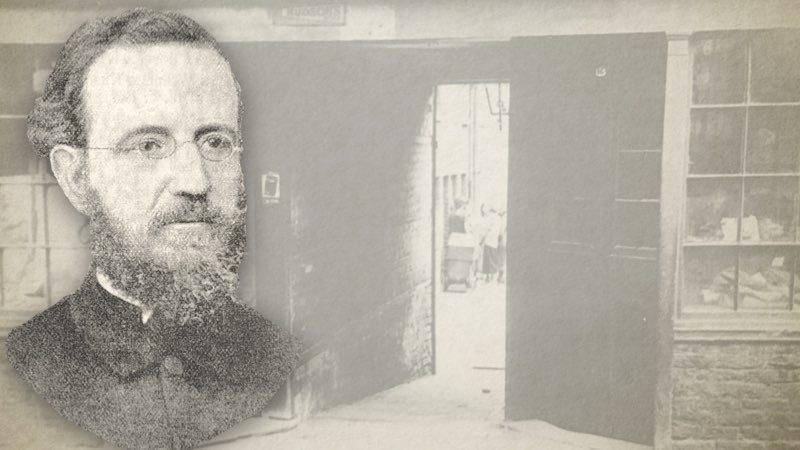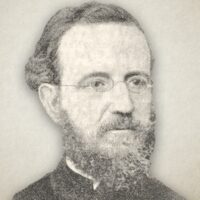
The Life And Ministry Of William Knibb Dexter
Earthen Vessel 1891:
Dear Mr. Editor,—Circumstances are constantly transpiring around us testifying to the fact that whilst the spirit is immortal the body is mortal. Lately a time-honoured and faithful minister of Christ, a beloved brother in the Lord, has been called from these scenes of labour and conflict to higher service in the glory world. William Knibb Dexter, the youngest son of Benjamin Bull Dexter, a missionary in Jamaica, co-temporary with William Knibb, of anti-slavery notoriety. He was born on December 29th, 1840, five years before the death of Knibb, and was named after his distinguished relative, Knibb, being related to the family. The child grew, and at an early age began to display some force of character, having a will of his own, and showing strong determination to carry his point in anything he took in hand. In the early part of 1853 the father was called to his reward. The widow and her three sons set sail for England on the 28th of April in the same year. Arriving in England, they settled at Bedford, where the boys were educated. William Knibb displayed an active and inquiring mind, and made the best of every opportunity for acquiring knowledge, and thus laying the foundation for a life of future usefulness in the service of the Lord.
When he was about 16 years of age, he obtained a situation in a solistor’s office, where he made great progress in knowledge. Whilst in Bedford he attended Bunyan Meeting, then under the pastoral care of the Rev. John Jukes, under whose ministry he greatly profited, and about this time, at the age of 16, he was led to a saving knowledge of Christ. He put on a public profession of discipleship to Jesus by Baptism, being baptized by Mr. Griffiths, then of Biggleswade. From his first conversion he took a lively interest in the young, and at once began work in the lord’s vineyard; was instrumental in reviving and building up the infant class; and conducted a Bible-class of young men with great success.
A gentleman who was a member of that class explained to me the other day his method of conducting that class, and it seemed to me to be in advance of some of the methods of to-day. He became secretary of a young men’s association. All these were in connection with Bunyan Meeting. The members of the association, on his leaving Bedford, presented him with a Bible and another book of reference useful in the study of the Scriptures. On the inner cover of these is an inscription expressive of the high esteem in which he was held; both of these books were used by him to the last.
He began preaching in the villages soon after his call by grace, and was well received by the people. When quite a child in Jamaica, he would often get into the chapel, ascend the pulpit, open the large Bible, read a text, and preach to the pews.
On one of these occasions an old woman, addicted to lying, crept into the chapel, not knowing that he was in the pulpit, and he not knowing that she was in the chapel, opened the book and read out, “All liars shall have their part in the lake that burneth,’ &c. The immediate effect was the audience vanished; what the ultimate effect was we are not told. In 1861 he received a unanimous invitation to the pastorate of the Church at Thurleigh, Beds. He continued for five years, the Lord blessing his labours. Here he married his wife, who has been a true help-meet, an affectionate, devoted, and faithful companion in sickness and in health to the end. From Thurleigh he went to Peterborough, where he preached for twelve months, when he received an invitation to the pastorate, but could not see his way to accept it. At this time he supplied at Foot’s Cray. Here, I believe, he received an invitation to the pastorate, but finally settled at Meopham, where he continued for ten years. Whilst at Meopham, to counteract the baneful influence of purely Church schools, he opened a day-school, to which he devoted much time and energy. Here he laboured assiduously for the good of the people, to the detriment of his own health. A letter just received from an old friend whose children he taught testifies to the high esteem in which he was held. Here his abundant labours were very much blessed. Feeling a change to be desirable, he moved to Grundisburgh, Suffolk, in 1877. This not proving a genial sphere of labour to him, in response to a cordial invitation from the Church at Dacre Park, Lee, he removed thither, and was publicly recognised as pastor on February 7th, 1881. Here he continued to labour with varying success, till from declining health he could no longer discharge the functions of the pastoral and ministerial office. On December 14th, 1890, he preached in the morning, but was unable to go out in the evening. Since that time his health has rapidly declined, until on February 26th the summons came, and he being ready, watching his Lord’s appearing, peacefully fell asleep in Jesus. Thus has passed away “a man greatly beloved.” leaving a widow and one child unprovided for, whom we prayerfully commend to the practical sympathy of surviving friends. Our brother Dexter was tender as a husband, loving as a father, faithful as a minister, trustworthy and trusted as a friend, Calvinistic in his theology, his views of truth were clear and comprehensive, his grip of truth was firm, his advocacy of truth fearless and intelligible. He was a Baptist of the regular order, from which he never swerved. Asking him if he could realize the truth with which he had sought to comfort others, he said he could fully. Knowing the fatal character of his disorder, he was calmly resigned to the Lord’s will, could confidently leave his loved ones to Him whom He had trusted, and who had not forsaken him in his deep need. Near the close he was unable to lie down in bed; he raised his head from his chest and sang the two first lines of “Jesu, lover of my soul,” and said, “I can’t sing any more; I wish someone would sing that to me.” Now, he does not need to sing that; the Lord has let him; he has flown to His bosom. Now he sings as he never did before, “All hail the power of Jesu’s name. &c.” Our dear brother was a large-hearted man, one in whom you would always find sympathy; a friend of all, the enemy of none; was beloved, and is lamented by a wide circle of friends. “The memory of the just is blessed.”
Mr. J. Cattell
The Funeral
In the March issue of the Earthen Vessel & Gospel Herald the tenth anniversary of brother Dexter’s pastorate was announced to be held on Tuesday, March 3rd, 1891. Man, however, proposes, but God disposes. Instead of the pastors anniversary, his funeral took place on that date, and the brethren who were announced to officiate at the one took part in the solemn service connected with his burial. The arrangements of the solemn occasion were wisely entrusted to the judicious care of Mr. Cattell; and five minutes before the time appointed for the service to commence, the mortal remains of our dear brother were brought into the chapel and placed on a bier in front of the pulpit, from which, for ten years, brother William Knibb Dexter had proclaimed the glorious Gospel of the grace of God. At two o’clock Mr. Cattell entered the desk, and commenced the sacred occasion by announcing the beautiful hymn, “Rest remaineth, oh how sweet!” Mr. J. H. Lynn read several portions from the Word of God, and Mr. Shaw, of Gravesend, engaged in the solemn exercise of prayer. Another hymn, “Asleep in Jesus, precious sleep,” and Mr. John Box, who was to have preached in the afternoon, delivered, with much feeling and sympathy, a very touching and powerful address on death, and in a most telling manner described the difference between the departure of a child of God and the death of an unbeliever, and sweetly reminded his audience that our brother Dexter’s condition was altered, but not his character. Mr. R. E. Sears followed, and said, since our brother’s departure three words had followed him— i,e., “Within the veil.” On this subject the speaker gave utterance to remarks suitable to the solemn occasion. One verse of “Jesu, lover of my soul ” being sung, Mr. Cattell pronounced the Benediction, and the procession, consisting of a hearse, three mourning coaches, and a long line of private carriages, was reformed, and wended its way to Lee Cemetery, where a large number of sympathetic friends gathered round the grave.
Among the ministers and other brethren gathered to show their respect and esteem to departed worth were Messrs. Cornwell, Holden, I. C. Johnson, Dalton, Squirrell, Gregg, Copeland, C. C. Harris, A. Hall, W. Lovegrove, and many others, the chapel being well nigh filled with a truly sympathetic audience, many coming from a great distance, who were carefully considered by the well-known kindness of Mr. Whittaker and his devoted partner.
John Waters Banks
William Dexter (1840-1891) was a Strict and Particular Baptist preacher. In 1881, he was appointed pastor of the church meeting at Dacre Park, Lee. The church was a member of the Metropolitan Association of Strict Baptist Churches. A few years prior to his death, he was appointed by the Association to deliver an address at Soho chapel, addressing the brethren on the power of God’s Word in the lives of His regenerate people.



